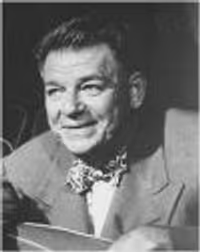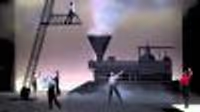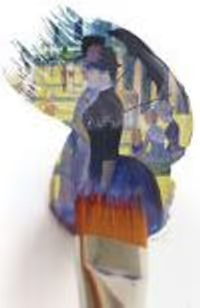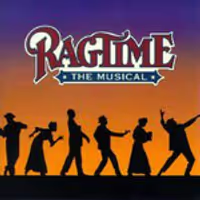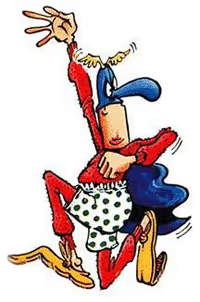Broadway Lyrics that Make No Earthly Sense
#50Broadway Lyrics that Make No Earthly Sense
Posted: 6/24/10 at 12:49am
peerrjb - Anne is saying Desiree is a ghoul.
iLoveBroadway4 - Instead of a fancy big city it was just Portland, not some place cool like New York or LA.
rich.hanson59
Stand-by Joined: 8/7/07
#51Broadway Lyrics that Make No Earthly Sense
Posted: 6/24/10 at 12:50amI always took the ghoul line from country to be Anne making a jab at Desiree's age. Which she does again "decrepit Desiree." The line referencing Madame Armsfeldt doesn't make sense in my opinion.
#52Broadway Lyrics that Make No Earthly Sense
Posted: 6/24/10 at 12:51am
I don't think "ghoul" in Weekend is referring to Madame Armfeldt. She's clearly referring to Desiree when she says "She may hope to make her charm felt."
As for Next to Normal, I think Natalie is looking down on the fact that they got married in Portland, as if it's something to be ashamed of...especially when Dan is trying to remember it as something much more beautiful and special than it was.
#53Broadway Lyrics that Make No Earthly Sense
Posted: 6/24/10 at 1:03am
She's OBVIOUSLY referring to Desiree.
Think, people...think.
AwesomeDanny
Broadway Legend Joined: 7/30/09
#54Broadway Lyrics that Make No Earthly Sense
Posted: 6/24/10 at 2:13amTo me, "Legally Blonde" actually makes some sense. It's saying that her hair color represents her character, and how Callahan is being trying to make it mean something else. It's like saying "I don't care about anything else, just don't take advantage of my looks". It's pretty hard to explain. The legally part of the phrase is there to imply the respect that she wants, working hard to be a Lawyer. She's saying "I've worked so hard for this, but he only sees the 'blonde' part of 'legally blonde'". Maybe I'm reading too far into simple wordplay, but i've always felt like there's a deeper meaning intended.
#55Broadway Lyrics that Make No Earthly Sense
Posted: 6/24/10 at 2:25am
"What the hell does 'Don't Cry for Me Argentina' mean?"
As I understood it, "cry" in this case means "shout." Just moments before, the crowd had been crying, or shouting, her name (Evita! Evita! Evita! etc.) until she appeared on the balcony.
Don't cry for me, Argentina
The truth is I never left you
In other words, Eva is reassuring them that, despite her newly-acquired wealth and status, she is still of the people and very much with them. (Argentina refers to the populace, of course.)
BTW: In the prolog and reprise "cry" does mean "weep" because it is sung when Evita is dead/dying. In conclusion, "cry" has a double meaning.
Vita, dulcedo, et spes nostra
Salve, Salve Regina
Ad te clamamus exsules filii Eva
Ad te suspiramus, gementes et flentes
O clemens O pia
#56Broadway Lyrics that Make No Earthly Sense
Posted: 6/24/10 at 3:16amOne Sondheim line always bugs me: "Don't know when, don't know where, and I can't even say that I care..." My eyes always pop out of my head at the non-sensical irony of singing passionately about not caring.
Feb. 28 - Looped, Feb. 28 - Next to Normal, March 4 - Hair, March 11 - A Little Night Music, March 24 - Time Stands Still, April 6 - La Cage Aux Folles, April 10 - Anyone Can Whistle (City Center), April 10 - Looped, May 9 - Enron, May 15 - A Little Night Music, May 15 - A Behanding In Spokane, May 30 - A Behanding In Spokane, May 30 - A Little Night Music, June 20 - A Little Night Music, June 23 - Red, June 23 - Sondheim on Sondheim, July 13 - A Little Night Music, July 18 - The Grand Manner (Lincoln Center)
#57Broadway Lyrics that Make No Earthly Sense
Posted: 6/24/10 at 3:20am
Not sure how the first N2N lyric confuse the poster. They are memories OF Gabe that have been erased, not Gabe's memory.
I think those lyrics are quite straight forward.
#58Broadway Lyrics that Make No Earthly Sense
Posted: 6/24/10 at 4:19amTim Rice has admitted that the 'Don't cry for me Argentina line' doesn't make a lot of sense, but it sounded good so they kept it.
#59Broadway Lyrics that Make No Earthly Sense
Posted: 6/24/10 at 4:51am
I've always taken the 'ghoul' line to refer to Madame Armfeldt as I'm pretty sure that the invitation comes from her (inviting others to her house) not Desiree.
One that confused me on the cast album was from Avenue Q: "It'll all be partly thanks to you" – it's either all thanks or partly thanks. When I saw it in London Princeton did a little shrug on that bit which just about made it work...
Updated On: 6/24/10 at 04:51 AM
#60Broadway Lyrics that Make No Earthly Sense
Posted: 6/24/10 at 8:07am
There's a line in Love Never Dies: "I just passed Meg's dressing room/It was empty as a tomb."
Tombs aren't usually empty, they likely have people in them. So it doesn't really make sense to say the room was empty as a tomb. A better fit would be to say that it was silent as a tomb. It would still convey the same idea.
#61Broadway Lyrics that Make No Earthly Sense
Posted: 6/24/10 at 9:24am
Re: "Don't know when, don't know where, and I can't even say that I care..." - like many of the quoted lyrics in this thread, you have to read before and after, or at least read the entire sentence. Fay isn't singing about how she doesn't care, she means she doesn't care when or where it happens, what's important is that it happens without fanfare. The whole thought is:
"Don't know when, don't know where, and I can't even say that I care, all I know is the minute you turn and he's suddenly there, there won't be trumpets!" Yes, it's a long-ish phrase (particularly when compared to the meaningless faux-poetic sound bites of Spring Awakening), but well worth the full read.
And Anne is definitely calling Desiree a ghoul, because the entire thing is: "No, the ghoul - she may hope to make her charm felt, but she's mad if she thinks I would be such a fool as to weekend in the country." Anne has never met Madame A, she's never heard of Madame A, she doesn't care about Madame A. She's obsessed that Frederik is still in love with Desiree.
#62Broadway Lyrics that Make No Earthly Sense
Posted: 6/24/10 at 10:02am
Anne is calling Desiree a "ghoul."
She isn't fooled by this invitation coming from "Madame Leonora Armfeldt" at all. She knows before she even finishes reading it that Desiree is behind this, scheming away.
Why would Anne think Mme. Armfeldt would "hope to make her charm felt?"
It's Desiree.
I think you're confused here because Angela Lansbury looks like a ghostly ghoul in her white makeup, white hair, and black mourning dress in this particular production. She DOES look like a ghoul, and I think it muddles the exchange between Anne and Petra.
... not to mention makes for one hell of an ugly-looking production.
blocked: logan2, Diamonds3, Hamilton22
#63Broadway Lyrics that Make No Earthly Sense
Posted: 6/24/10 at 10:03am
"It'll all be partly thanks to you" makes sense when you realize that the "all" refers to what the character plans to do. "All of it- the whole plan- will be partly thanks to you."
Wicked's infamous "bridges you cross" line is typically taken as a tongue-in-cheek homage/parody of Sondheim's lyrics for Into The Woods.
Phyllis Rogers Stone
Broadway Legend Joined: 9/16/07
#64Broadway Lyrics that Make No Earthly Sense
Posted: 6/24/10 at 10:04amIt is? I'd never heard the before.
#65Broadway Lyrics that Make No Earthly Sense
Posted: 6/24/10 at 10:14am
The biggest problem with using "hoi polloi" in "One Short Day" is that it's completely out-of-character for both Elphaba and Glinda to say that. Even if they knew the word and its meaning, which has archaic Latin roots, it's a derogatory phrase, historically used by upper-class snobs, to describe the minions (or the "uneducated masses," "commoners," or "common people").
It's a fancy term used by "fancy" people to describe lowlifes.
And it's completely wrong for that song and those characters at that moment in their lives walking through the Emerald City.
"I want to be among the commoners!" It implies, of course, that they realize they are above all of them.
Well screw you, ladies. The door's thataway!
blocked: logan2, Diamonds3, Hamilton22
#66Broadway Lyrics that Make No Earthly Sense
Posted: 6/24/10 at 10:16amHoi polloi is Greek. And to precede it with "the" is redundant (not that you did, but just saying).
Phyllis Rogers Stone
Broadway Legend Joined: 9/16/07
#67Broadway Lyrics that Make No Earthly Sense
Posted: 6/24/10 at 10:18am
Not that Stephen Schwartz was Sondheim back in the day, but his lyrics for Wicked are demonstrably worse than anything he's ever written.
#68Broadway Lyrics that Make No Earthly Sense
Posted: 6/24/10 at 10:18am
I stand corrected. Greek not Latin (or French for that matter) ...
And who preceded it with "the?" Not me or Schwartz.
EDIT: Wait, Schwartz did precede it with "the" in the song ...
Why is it incorrect? I Googled it just now and Byron preceded it with "the." Most English writers do and did, it seems.
blocked: logan2, Diamonds3, Hamilton22
#69Broadway Lyrics that Make No Earthly Sense
Posted: 6/24/10 at 10:28am
I acknowledged that you didn't use "the." Schwartz precedes it with "this," which is just plain odd, as it means "I wanna be in this the common people."
(Derivation: hoi, meaning "the" and used before a plural, and polloi, the plural of polus, "many.")
To my ear, it is best used as an adjective, rather than as a noun (even though it is technically a noun). If used as a noun, I suppose you could say "the polloi are easily swayed," or "I wanna be in this polloi," but it's not the same thing at all, is it?
#70Broadway Lyrics that Make No Earthly Sense
Posted: 6/24/10 at 10:33am
Just saw your edit - yes, many, many, many famous writers have preceded hoi polloi with "the." And many teachers have used the argument that usage and precedent trump facts.
But since hoi already means "the," it's undeniably redundant to add another "the" to the the mix.
The. (Just wanted to get another one in.)
#71Broadway Lyrics that Make No Earthly Sense
Posted: 6/24/10 at 10:36am
"Wicked's infamous "bridges you cross" line is typically taken as a tongue-in-cheek homage/parody of Sondheim's lyrics for Into The Woods."
...Taken by whom? I have never heard that interpretation, either. And it seems like an apologist's reason for a poorly constructed lyric, especially since there are no other tongue-in-cheek homage/parodies of Sondheim or Into the Woods in the show.
Too many of Spring Awakening's lyrics are poetic-sounding nonsense.
#72Broadway Lyrics that Make No Earthly Sense
Posted: 6/24/10 at 10:52am
"Its not up to me, just let me be Legally Blonde" How exactly can one be Legally Blonde? The premise of the song makes no sense, especially for the "emotional climax" of the show.
The song is referring to the insults Callahan hurls at Elle and Emmett by calling them "Legally Blonde" and "Torn Cordouroy". Elle decides to possibly quit and go back to being the stereotype everyone assumes her to be. In the reprise, Vivienne teaches Elle to redefine "Legally Blonde" as the surprisingly intelligent blonde girl everyone has underestimated. I think it's quite ingenious, actually. And I think the show is terribly underrated. I find Legally Blonde to be a delightful contemporary take on the classic musical comedy. I hope it wins the Olivier for Best Musical in London.
As for bad lyrics, I can't stand most of the lyrics in Spring Awakening. My partner and I were actually laughing during the finale because we had no idea what they were singing about.
This does this
These do this
That does that
And I'll sing the song of purple summer
And all shall know the wonder of purple summer
Wait...what? I don't. What the hell is purple summer? Wait...that's the end?!?!
#73Broadway Lyrics that Make No Earthly Sense
Posted: 6/24/10 at 11:00am
Legally Blonde - sigh. I remember thinking, as this awful title sung was spinning out, "not only can they not use their imagination and think of a new title, they feel that they have to somehow create a title song." The logic is tortured in that song; you have to do mental back flips to convince yourself the phrase means anything.
But that brings one to another kvetch - the fact that adaptations today merely keep the original title (probably for marketing reasons).
Imagine these unimaginative titles:
Green Grow the Lilacs, the Musical
Anna and the King of Siam, the Musical
The Story of the Van Trapp Family Singers, the Musical
Tevye and His Daughters, the Musical
The Matchmaker, the Musical
Pygmalion, the Musical
Jon
Broadway Legend Joined: 2/20/04
#74Broadway Lyrics that Make No Earthly Sense
Posted: 6/24/10 at 11:15am
There's a lyric in act 2 of FALSETTOS (a lyric that's NOT on the original FALSETTOLAND cast album) in which Jason sings about going back and forth from his mother's to his father's apartment:
"First take the 104 with my computer
I'm just a little kid, not a commuter"
Now, we know that "the 104" is the bus... but what the **** kind of computer is he taking with him... in 1980??? They certainly didn't have laptops then.
Methinks Mr. Finn just liked the rhyme, and didn't know is PC history.
Videos



